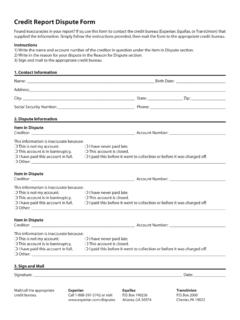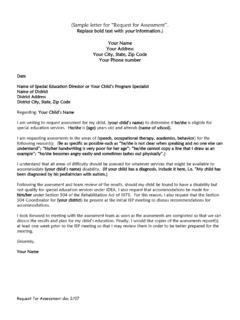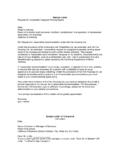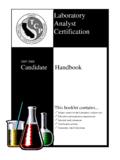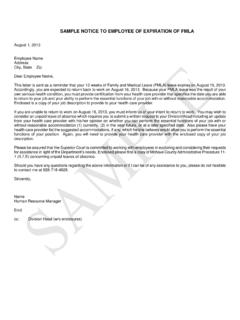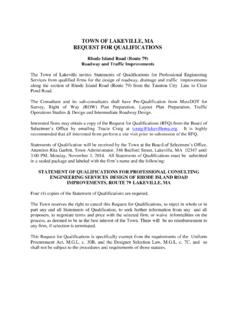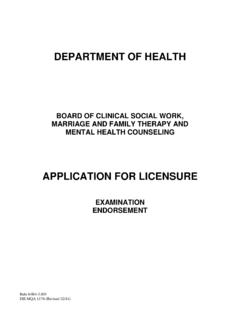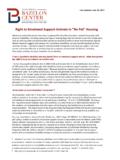Transcription of REASONABLE ACCOMMODATION and …
1 REASONABLE ACCOMMODATION and REASONABLE MODIFICATIONS Under the FAIR HOUSING ACT (Self-Help Packet) An Austin Tenants Council Fair Housing Program Publication 2001 Austin Tenants Council REASONABLE ACCOMMODATION and REASONABLE Modifications Under the Fair Housing Act is published by the Austin Tenants Council Fair Housing Program. This publication is supported by a grant from the Department of Housing and Urban Development, Fair Housing Initiatives Program. The substance and findings of the work are dedicated to the public. The publisher is solely responsible for the accuracy of the statements and interpretations contained herein. Such interpretations do not necessarily reflect the views of the government. REASONABLE ACCOMMODATION & REASONABLE Modifications Under the Fair Housing Act Table of Contents I. How to Use This Packet II. The Fair Housing Act III. Additional Protections for Persons With Disabilities IV.
2 REASONABLE ACCOMMODATION Under the Fair Housing Act V. What Is a REASONABLE ACCOMMODATION ? VI. REASONABLE Modifications Under the Fair Housing Act VII. How to Request REASONABLE ACCOMMODATION or REASONABLE Modifications A. How to Write a Request for REASONABLE ACCOMMODATION B. Example Request for REASONABLE ACCOMMODATION Letter C. How to Write a Request for REASONABLE Modifications D. Example Request for REASONABLE Modifications Letter VIII. Blank Form Letters A. Blank Request for REASONABLE ACCOMMODATION Letter B. Blank Request for REASONABLE Modifications Letter IX. Austin Tenants Council Fair Housing Program brochure X. Fair Housing: It s Your Right brochure from the Department of Housing & Urban Development (HUD) Office of Fair Housing & Equal Opportunity I. How to Use This Packet The Fair Housing Program of the Austin Tenants Council provides this packet for educational and informational purposes.
3 Persons with disabilities, their friends, and advocates can use the forms in this packet for requesting REASONABLE ACCOMMODATION and REASONABLE modifications under the Fair Housing Amendments Act of 1988. However, this packet is not a substitute for legal advice. Anyone seeking legal advice should contact an attorney. II. The Fair Housing Act The Fair Housing Amendments Act of 1988, known simply as the Fair Housing Act, prohibits discrimination in housing because of race or color, national origin, religion, sex, familial status, or handicap or disability. These categories are known as federal protected classes. Housing providers, real estate agents, mortgage lenders, and appraisers cannot discriminate or treat anyone differently because he or she is a member of any of the protected classes. III. Additional Protections for Persons With Disabilities Disability is one of the protected classes under the federal Fair Housing Act.
4 Up until the amendment of this law in 1988, disabled persons not living in public housing were not protected from housing discrimination by federal law. Under federal fair housing law today, a housing provider cannot discriminate against a disabled person on the basis of their disability, or because they are disabled This means that a housing provider cannot refuse to rent to someone, or set different terms or conditions, simply because that person has a disability or because of that person s particular disability. This kind of discrimination is called disparate treatment. The Fair Housing Act defines a person with a disability as someone with a physical or mental impairment that substantially limits one or more major life activities, someone who has a record of such an impairment, or someone regarded as having such an impairment. Major life activities include such functions as walking, breathing, seeing, hearing, working, etc.
5 A disability can be temporary or permanent. Persons with temporary disabilities are protected against discrimination in the same way as are persons who have permanent disabilities. In addition to prohibiting disparate treatment on the basis of disability, the Fair Housing Act grants persons with disabilities additional protection from housing discrimination. This additional protection falls into two categories: REASONABLE ACCOMMODATION and REASONABLE modifications. These requirements of the Fair Housing Act were passed to make existing housing more accessible to and usable by persons with disabilities. IV. REASONABLE ACCOMMODATION Under the Fair Housing Act Section 804(f)(3)(B) of the Fair Housing Act defines one type of discrimination against disabled persons as a refusal to make REASONABLE accommodations in rules, policies, practices or services, when such accommodations may be necessary to afford such person equal opportunity to use and enjoy a In summary, a housing provider is required by federal law to make REASONABLE accommodations in rules, policies, and procedures, to allow disabled persons equal opportunity to use and enjoy their dwelling.
6 V. What Is a REASONABLE ACCOMMODATION ? As previously explained, REASONABLE ACCOMMODATION under The Fair Housing Act refers to a change in rules, policies, practices or services, that a housing provider makes to allow a disabled person equal opportunity to use and enjoy a dwelling. What does this really mean? The Fair Housing Act does not itself define what is considered REASONABLE , although it mandates REASONABLE accommodations for persons with disabilities. There is no clear litmus test in interpreting whether or not a request for REASONABLE ACCOMMODATION by a disabled person is actually REASONABLE . However, in the Preamble to the Final Rule Implementing Fair Housing Amendments Act of 1988, it is stressed that housing providers are not required to provide counseling, medical, or social services to persons with disabilities that they do not normally provide to their non-disabled residents. REASONABLE ACCOMMODATION is generally considered a change in rules, policies, practices, or services that is feasible and practical under the circumstances.
7 In general, a request for REASONABLE ACCOMMODATION is considered REASONABLE if the ACCOMMODATION requested by the disabled person: 1. Will not cause an undue financial or administrative burden to the housing provider; 2. Will not cause a basic change in the nature of the housing programs available; 3. Will not cause harm or damage to others; and 4. Is technologically possible. The following examples illustrate the concept of REASONABLE ACCOMMODATION under the Fair Housing Act: Example 1: Susan, a blind woman with a guide dog, applies for rental housing at an apartment complex that has a No Pets policy. There are available apartments and Susan meets all the criteria necessary for approval of her application. Upon Susan s request, the housing provider must make a REASONABLE ACCOMMODATION in their rules and policies to allow Susan to rent an apartment and keep her guide dog. Without her guide dog, Susan would not be able to live in an apartment and she would not have an equal opportunity to use and enjoy an apartment.
8 Example 2: John recently became disabled due to an on-the-job injury and he now cannot walk more than a short distance. The apartment complex where he lives offers parking to its residents on a first come first served basis. John makes a written request for REASONABLE ACCOMMODATION to management that they designate a reserved parking space for him near his apartment so he will be able to walk the distance from his car to his apartment. John s housing provider must make this REASONABLE ACCOMMODATION in their services to allow John equal opportunity to use and enjoy his dwelling. Without reserved parking near his apartment, John would not be able to live at the apartment complex. Furthermore, it is REASONABLE that the housing provider bear the costs of any cosmetic and structural changes necessary to designate a reserved parking space for John as long they are not an undue financial burden. Example 3: Maria was recently diagnosed with a disability that prevents her from working.
9 She now receives an SSDI check every 5th day of the month rather than income from an employer. Under her lease contract, her rent is due on the first day of each month and late fees begin to accrue on the third day of the month. Maria makes a written request for REASONABLE ACCOMMODATION that her landlord waive late fees and allow her to pay rent on the sixth day of each month without penalty. Maria s landlord must make this REASONABLE ACCOMMODATION in rules to allow her an equal opportunity to use and enjoy her dwelling, as long as it does not cause an undue financial or administrative burden. The key in this example is the nexus or tie-in between Mary s disability and her income. Maria s disability affects when she receives her income, which in turn affects when she can pay her monthly rent. VI. REASONABLE Modifications Under the Fair Housing Act Section 804(f)(3)(A) of the Fair Housing Act requires a housing provider to allow a disabled tenant, at their expense, to make REASONABLE modifications of existing premises if they may be necessary to afford such person full enjoyment of the premises or dwelling.
10 Modification means a change to a structure that will allow physical access to a person with a disability. This requirement is applicable to the interior of a disabled person s dwelling as well as public and common use areas of an apartment complex. Such modifications may be requested at any time; it is not necessary that they be requested at the beginning of a tenancy. Please Note: The Fair Housing Act makes clear that such modifications will be the financial responsibility of the disabled person making the request. A person seeking REASONABLE modifications must seek approval from their housing provider before making the modifications. In addition, a housing provider can require the following before approving the modification: 1. That the disabled person provide a REASONABLE description of the proposed changes, and 2. That the disabled person provide assurance that the modifications will be done in a workmanlike manner and that any required building permits will be obtained.
